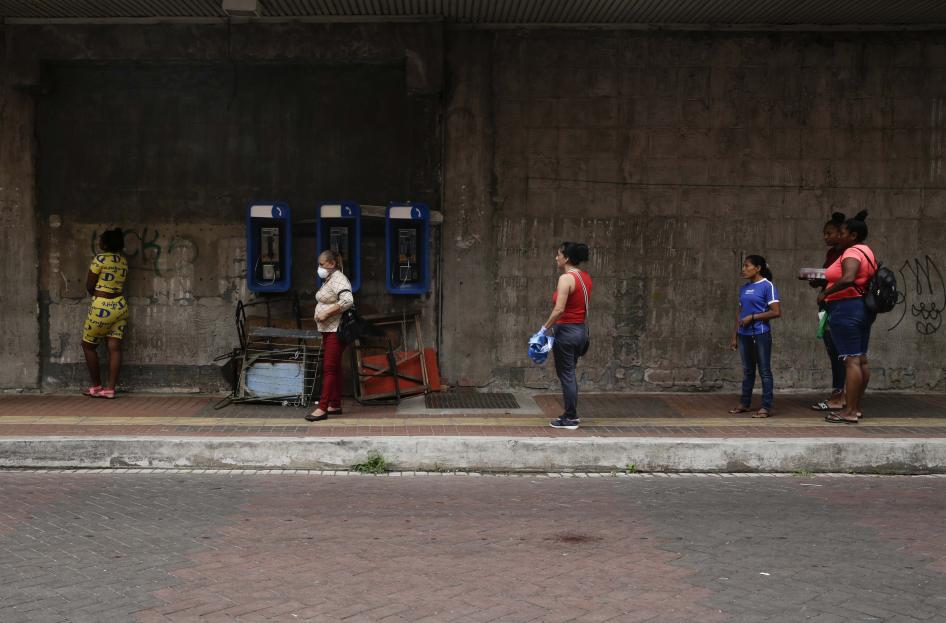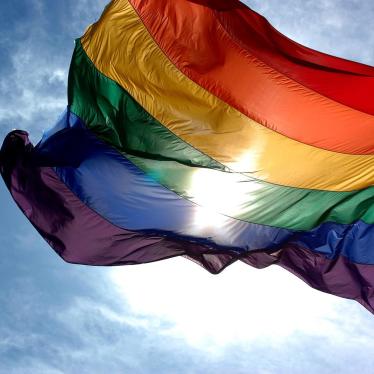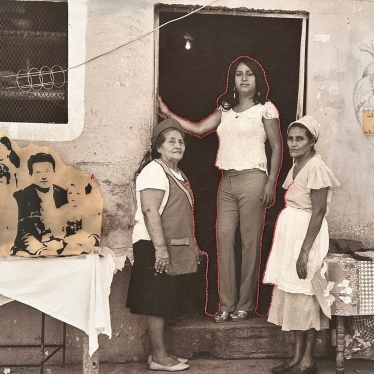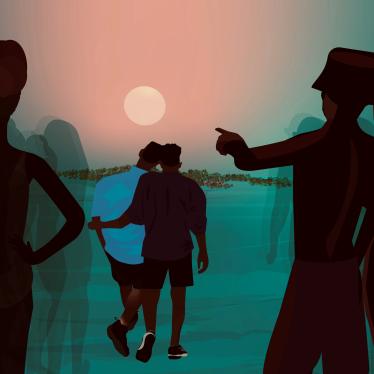(Washington DC) – Six transgender people have been stopped by security officials in Panama in recent weeks for allegedly violating Covid-19 curfew rules based on gender, even though the government had promised to resolve the problem, Human Rights Watch said today. The government needs to take more decisive steps to prevent the continuing discriminatory impacts of its gender-based quarantine or scrap the measure altogether.
The quarantine schedule, implemented by the Health Ministry on April 1, 2020, requires women and men to remain at home on alternate days. From the first day of these measures, trans people – who have a gender identity or expression that may not match the “female” or “male” sex marker on their identification document – faced discrimination.
“The Ministry of Public Security took an important step when it acknowledged discrimination against transgender people, but transgender people are still experiencing discrimination,” said José Miguel Vivanco, Americas director at Human Rights Watch. “To effectively address this problem, Panama needs to either explicitly authorize transgender people to comply with the quarantine in accordance with their gender identity or expression or scrap gender as a basis for quarantine measures.”
On May 11, the Public Security Ministry issued a statement announcing that it had “spoken with the security sector to prevent any type of discrimination against the LGBTI population” in carrying out the Covid-19-related restrictions. The announcement followed reporting, including by Human Rights Watch, that police and private security guards had been singling out transgender people for profiling, arresting them or preventing them from buying essential items.
But the ministry has yet to issue any guidance as to how trans people are expected to comply with the gendered quarantine measures. And since this statement, Human Rights Watch has documented six more incidents of discrimination, including one arrest. Other trans people said they avoided leaving their homes for fear of arrest or humiliation.
Between June 1 and June 7, Panama replaced its gender-based quarantine measures with a curfew from 7 p.m. to 5 a.m. However, starting June 8, Panama reinstated the gendered quarantine in the provinces of Panama and West Panama, the country’s most populous, citing a rising number of Covid-19 cases.
Panama is not unique in setting gender-based quarantine measures but it is a rare approach, raising questions of whether it is necessary and proportionate, in addition to concerns about its discriminatory impact. For example, in Peru, similar measures were scrapped after just eight days. In Colombia, law enforcement officers in the capital, Bogota, were instructed to respect gender identity and did not demand an ID to enforce compliance. Bogota scrapped its gendered quarantine starting on May 11.
In four of the six new incidents that Human Rights Watch documented, police and private security agents discriminated against trans people when they left their homes for essential needs on days that corresponded to the sex marker on their national identification card. These people were complying with the rules established by the Health Ministry, but police or security agents believed they were out on the wrong day and targeted them due to their gender expression. In two other cases, trans people faced discrimination – and in one case, arrest – when they left home for essential needs on days that corresponded to their gender identity or expression.
International human rights law recognizes that governments may be legally justified in restricting some rights, including freedom of movement, in the context of serious public health threats and public emergencies, like Covid-19. However, law enforcement agents and private entities may not discriminate against individuals on the basis of their gender identity or expression when enforcing emergency measures. Discrimination is particularly harmful when it keeps transgender people from seeking medical help or acquiring life-sustaining necessities like food and medicine, Human Rights Watch said.
The Panamanian government should establish clear guidance authorizing residents to comply with the gender-based quarantine in accordance with their gender identity or expression, Human Rights Watch said. Currently, for the majority of transgender people who go out based on the sex marker on their identification, their gender expression is often different from their sex marker, making them vulnerable to profiling. Panama should also issue a directive for law enforcement agents reiterating the obligation to respect Panamanians’ gender identity and expression, and issue warnings along the same lines for private entities like supermarkets and their security agents.
“Many transgender people in Panama are trying to cooperate with the government in this time of public health crisis,” Vivanco said. “The government of Panama should meaningfully respond to their realities and protect their rights.”
For details about the new incidents of discrimination, please see below.
New Cases of Discriminatory Enforcement of Covid-19 Rules
Since May 11, Human Rights Watch documented six incidents of discrimination against transgender people in Panama. Human Rights Watch also spoke again with four people who had similar experiences earlier. All four said they had been afraid to leave their homes.
Discrimination When Circulating in Accordance with the Identification Document Sex Marker
- During the week of June 8, on a day designated for men, Pamela, a trans woman, and her male partner went to a supermarket in the Calidonia neighborhood of Panama City to use a government-issued food voucher. A security agent told Pamela that she could not enter. After Pamela explained that she was a trans woman and showed her male identification card, she said that the security agent still did not let her in because she was wearing feminine clothes. Pamela said, “I was extremely angry, and my partner had to enter the supermarket to shop. I had to stay outside. I have still not used the voucher in its entirety, and I am scared of what will happen if I go to use it.”
Before the Public Security Ministry’s May 11 statement, Pamela had been denied entry to the same supermarket on two occasions on days designated for men, once by a police officer and once by a private security agent. Both, Pamela said, told her that her body was “too feminine.”
- On May 16, a day designated for men, a police officer stopped Manuela on her way to a market in the Santa Ana neighborhood of Panama City and asked for her letter of transit, allowing any person to be out for essential needs. Manuela said:
I told them that I was a trans woman and I showed them my identification that says “male,” but the police officer called her supervisor. She didn’t know what to do with me. When the supervisor arrived, she told me that people like me just want to go out any day we please.
When the supervisor looked at her identification, she realized that Manuela was also out at the wrong time of the day and reprimanded her for this. Manuela was released when a third officer arrived and urged the first officer and the supervisor to let her go with a warning.
- On June 13, Adriana, a 34-year-old trans woman, tried to shop at a supermarket in the Villa Zaita neighborhood of Panama City. A private security agent questioned her but let her in after seeing her identification. However, when Adriana was leaving, the security agent was speaking with a police officer. Adriana said:
The police officer looked at me and questioned in a rude manner whether I was a man or not. I did not want any trouble or to get arrested, so I didn’t say anything and left. It’s better to stay quiet in these situations because we trans women are always the ones who end up harmed.
Adriana had an earlier experience of discrimination. On April 9, while she was waiting to enter a bank on a day designated for men, a private security agent told her that she was “dressed inappropriately.” She had to speak with another security agent, an employee, and a manager before being allowed to complete her transaction.
- On May 29, a day designated for women, Linx, a 21-year-old trans man, went to a supermarket in the Punta Pacífica district of Panama City with his grandmother. Linx’s grandmother stayed in the car, while Linx lined up to enter the supermarket. A private security agent questioned him about his gender identity for several minutes, allowing other customers to bypass him in the line, before allowing him in. Linx said, “I felt powerless and was speechless. I just wanted to buy ice cream at the supermarket for my family and had to face this.”
Arrest and Discrimination When Circulating in Accordance with One’s Gender Identity
- On June 10, a day designated for women, Katherine, a 24-year-old transgender woman from West Panama Province, was on her way to a medical appointment for treatment of a kidney condition. Two police officers stopped her on the street, apparently because they did not think she looked like a woman. Katherine showed the officers a paper with her appointment, but the officers called a patrol, handcuffed her, and took her to a police substation in Burunga.
“In the substation, there were seven officers and they were laughing at me,” she said. “I was wearing make-up and they were mocking that. They put me in a cell by myself.” She was released about an hour and half later, only after a higher-ranking official listened to her story and ordered her release. “I ran to the hospital to make the appointment even though I was late and luckily I could still see the doctor,” Katherine said.
- In mid-May, “Luis,” a 22-year-old trans man, went with his father to a supermarket in the Condado del Rey neighborhood in Panama City. The supermarket’s private security agent checked his identification. Luis said, “He looked at me in a strange manner, shifting his gaze from my identification to me…. It was very uncomfortable.” The agent did not let Luis enter the supermarket and Luis stayed in the car while his father shopped.
Fear of Leaving Home, Including for Essential Goods or Services
Human Rights Watch also spoke again in June with four trans people Human Rights Watch had interviewed in April from the provinces of Panama and West Panama. All said they avoid going out for fear of another incident of discrimination:
- Miranda, a transgender woman in Panama Province who faced discrimination in April when attempting to enter a supermarket on a day designated for men, reported that she has not left her home for fear of discrimination. She received a food basket from the community-organized Trans Solidarity Network and is trying to make it last as long as possible.
- Mónica, a transgender woman who was arrested and fined in April when she attempted to enter a supermarket on a day designated for men, said that she has tried not to leave home for fear of another arrest. Her friends and family do her shopping for her. Mónica said, “I feel like a prisoner. It’s unjust. I cannot risk going out again and having to pay a fine. I don’t have the money to give the government.”
- “Sofía,” a transgender woman who was denied entry into a supermarket in April on a day designated for men, said, “I am scared every time I leave my home.” She said that even though she has a letter of transit from her workplace, she fears any contact with the police and purposefully does not leave her vehicle if she sees them. She often pays for grocery delivery services instead of risking discrimination at the supermarket.
- Li, a transgender man from Panama Province who was denied entry to a supermarket in April on a day designated for women, said, “I am taking it one day at a time, it’s a stressful situation and I try not to leave my home because there are situations where people don’t understand the issue.” Li pays for grocery delivery services instead of risking discrimination at the supermarket.









